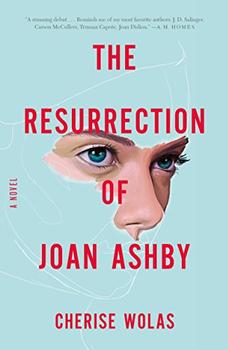Summary | Excerpt | Reading Guide | Reviews | Beyond the Book | Readalikes | Genres & Themes | Author Bio

Joan fixed salads with tomatoes and cucumbers from their own garden. She held up a bottle of wine, and Martin shook his head, "Work," he said. She opened the bottle anyway, poured herself a glass, and they ate at the kitchen table, the windows all thrown open. The sun was just setting, it was nearing eight, and Martin was on his way back to the hospital. "I may sleep there tonight," he said, which he sometimes did when he was worried about a patient who was not doing well. He kept a clean suit, shirt, and tie in his office. He never told her the names of his patients, gave her only brief précis of who they were. This one that he was worried about was Japanese, a grandfather, father, husband, a lover of the tea ceremony, and Joan had named him Mr. Kobayashi.
Martin grabbed a couple of apples from the bowl on the counter, kissed the top of Joan's head, and shut the back door quietly. She heard his new car rev up, a Mercedes, all black. Years of driving secondhand Toyotas, he adored his car like a mistress, teaching the boys how to wash and wax on a couple of weekends. He had gotten the top-of-the-line sound system installed. Once he was beyond Rhome, he had twenty miles of pure highway, always racing beyond the speed limit, blasting the music, the windows down, screaming the lyrics.
The kitchen was clean and Joan was back at the table, her typewriter, silently retrieved from Eric's closet just minutes earlier, plugged in for the first time in five years. She had dusted it off, checked that the cartridge still had ink, which it did. She had found reams of paper in that closet too, had taken one. Ripping off the wrapping around five hundred sheets of virgin paper had felt like love to her, overwhelming, never-going-to-happen-again love. She was thrilled Martin had gone back to the hospital to watch over Mr. Kobayashi. The idea had come to her in one fell swoop during the afternoon, because of the fair, and she had to start to get it down.
There was a potential novel there, she knew. She felt its commanding logic, both internal and external, powerful enough to keep her tethered to home, to silence the fears that she would never write again, eliminate the horrid daydream in which she sometimes indulged, about simply walking away from this alternative life she was living, filled with its soft poetry and hard tediousness, its spectacular, love-ridden times measured against meaningless hours and days and weeks and months, a life where her past accomplishments were long forgotten, where she was called, most often, Joan Manning, leaving her tongue-tied and wishing she could say, "I'm not Joan Manning, I'm Joan Ashby, the writer." That indulgent daydream about leaving all this behind. Leaving the children, Martin, the house that was too small, the great stretch of land that was, like the house, in her name alone, where she used to think she would set up a writers' colony. Leaving it all behind and never returning, stepping back into her original skin, where she was only, foremost, supremely, the writer Joan Ashby, no longer tied to the person she still mostly loved, the children they had made together that she loved with unequal force.
She thought about the boys in their beds, before their existences entirely fell away, their breathing no longer her concern. There was only the hum of the overhead light and the refrigerator, and then only the words in her head rushing onto the page.
We were young, and some of us were beautiful, and others of us were brilliant, and a few of us were both. Citizenship demanded only an ability to create, to use our minds and hands and bodies in unforeseen ways. We believed we knew more than those who had tried before us. Their experiment had failed, but their hard lessons would serve as our guide. Passionate, arrogant, certain we would not falter,or deceive, or betray ourselves, that we would not blacken our lives with whitewashed expectations, our presence here, in this arcadia, proved we had slipped the ropes and chains of expected, normal life. We considered everything. Except everything. By its very nature, everything resists corralling; it is far too expansive. You think you've avoided every last trap, but what you hadn't considered, what you never could plan for, it is that which trips you up.
Excerpted from The Resurrection of Joan Ashby by Cherise Wolas. Copyright © 2017 by Cherise Wolas. Excerpted by permission of Flatiron Books. All rights reserved. No part of this excerpt may be reproduced or reprinted without permission in writing from the publisher.
On the whole, human beings want to be good, but not too good and not quite all the time
Click Here to find out who said this, as well as discovering other famous literary quotes!
Your guide toexceptional books
BookBrowse seeks out and recommends the best in contemporary fiction and nonfiction—books that not only engage and entertain but also deepen our understanding of ourselves and the world around us.